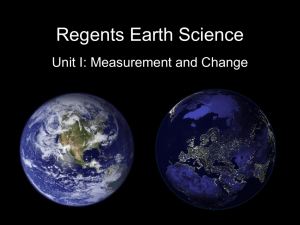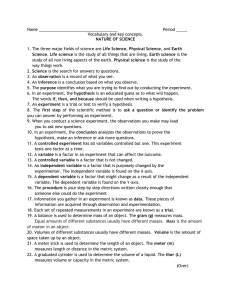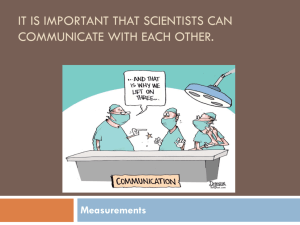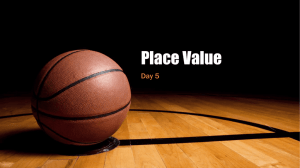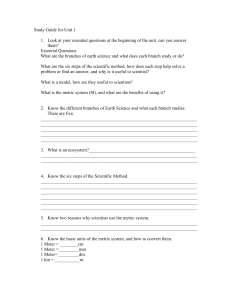Length
advertisement
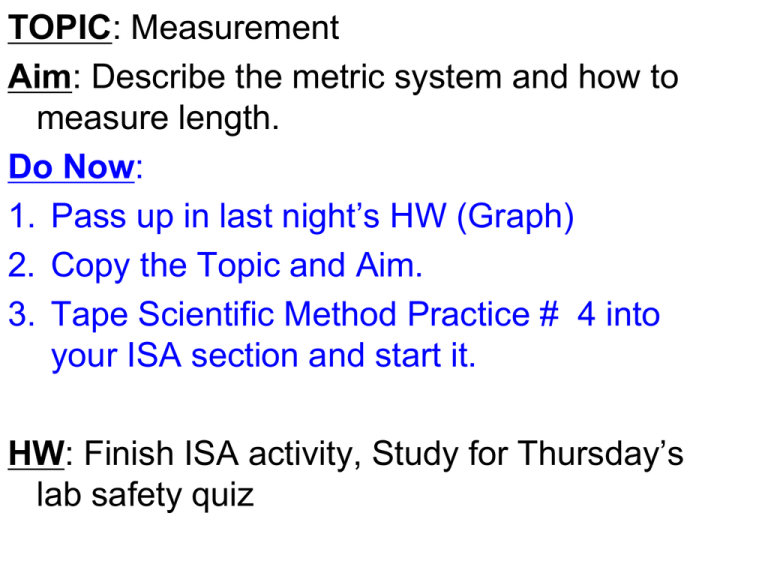
TOPIC: Measurement Aim: Describe the metric system and how to measure length. Do Now: 1. Pass up in last night’s HW (Graph) 2. Copy the Topic and Aim. 3. Tape Scientific Method Practice # 4 into your ISA section and start it. HW: Finish ISA activity, Study for Thursday’s lab safety quiz 10 23 39 48 64 77 87 98 INCORRECT!!! The scale has no CONSISTENT interval. 5 10 15 20 25 30 35 40 45 50 55 60 65 70 75 80 85 90 CORRECT!!! The scale has a CONSISTENT interval. It goes by 5’s. 10 15 20 25 30 35 40 45 50 55 INCORRECT!!! The number of boxes between the numbers is not the same. 50 55 60 65 70 75 80 85 90 CORRECT!!! The number of boxes between numbers is the same. There is a consistent interval. 20 40 60 80 100 120 CORRECT!!! There is a consistent interval. The number of boxes between each number is the same. 0 10 20 60 65 70 CORRECT!!! No consistent interval. 75 80 85 90 0 10 20 60 65 70 75 80 85 90 INCORRECT!!! The numbers are not beneath the lines. They are between the lines. The driver of a tractor-trailer truck that was more than 13 feet tall attempted to drive under a 12-foot bridge. According to spokesman Stephen MacDonald, the truck was carrying chemicals. The city’s hazardous materials team responded, but no chemicals or fuel ultimately leaked. Unit • A known amount of measurement • Ex: Yard, meter 2 Systems 1. METRIC SYSTEM • Used by most of the world • SI units 2. ENGLISH SYSTEM • inch, foot, ounce Did you know…? • The metric system is much easier. All metric units are related by factors of 10. • Nearly the entire world (95%), except the United States, now uses the metric system. U.S. economic competitiveness would be strengthened by converting to the metric system. LENGTH • METER (m) • Ruler/meter stick A B How many millimeters are found in 1 centimeter? 10mm = 1cm LENGTH • METER (m) • Ruler/meter stick • 1cm = 10mm A B C D E F 1. Measure the length of the paper clip in cm to the nearest tenth. 1.8cm 2. Measure the length of the paper clip in mm. 18mm 1. Measure the length of the pencil in cm to the nearest tenth. 7.5cm 2. Measure the length of the pencil in mm. 75mm • 1 cm = 10 millimeters • 1 m =100cm = 1000mm 1 mm = width of a dime • 1 kilometer (km) = 1000m - Kilo = 1000 Let’s summarize… 1. Explain the DIFFERENCE between the two systems of measurement. 2. What are the SI units for length? 3. How many cm make up a m? 4. How many mm make up a cm? 5. How many mm make up a m? 6. How many m make up a km? 0 cm 1 2 3 4 What is the length of the object in centimeters to the nearest tenth? Millimeters? 1.6cm 16mm 0 cm 1 2 3 4 What is the length of the object in centimeters to the nearest tenth? Millimeters? 1.9cm 19mm Which group of measurement units is correctly arranged in order of increasing size? 1. mm, cm, m, km 2. mm, km, cm, m 3. m, km, cm, mm 4. km, cm, mm, m In the metric system, the height of a building would be given in 1. centimeters 2. milliliters 3. meters 4. millimeters In the metric system, the width of a textbook would best be given in 1. centimeters 2. milliliters 3. meters 4. liters A factor in an experiment that remains constant is called a 1. control 2. variable 3. theory 4. hypothesis The results of one experiment carried out by a research team would be considered valid if a. the experiment had no control setup b. all the members of the research team came to the same conclusion c. the experiment had more than one variable d. the experiment was repeated and the same results were obtained each time An investigation was designed to determine the effect of ultraviolet light on mold spore growth. 2 groups of mold spores were grown under identical conditions, except 1 group was exposed only to UV light, while the other group was grown in total darkness. In this investigation, the group of mold spores grown without receiving any UV light is known as the a. experimental variable b. hypothesis c. control group d. limiting factor The first step in the scientific method is a. to state the problem b. experimentation c. to state the hypothesis d. observation An educated guess to the problem of an experiment is known as a a. variable b. theory c. hypothesis d. law When performing an experiment, you are testing the a. problem b. hypothesis c. data d. conclusion The hypothesis is based on the 1.conclusion 2.dependent variable 3.data collected 4.background research Your senses can be used to make a(n) a. observation b. conclusion c. hypothesis d. problem To test the effect of hormones on plant height, the height of 6 potted plant seedlings of the same species were measured and then sprayed with a growth hormone. After 4 weeks of growth under ideal conditions, the height of the plants were measured again. 1. How would you set up the control group? 6 plants sprayed with water 2. Identify the independent and dependent variables. Independent variable: growth hormone Dependent variable: plant height 3. Give 2 factors that must be kept constant. Species, sunlight, same amount of soil
